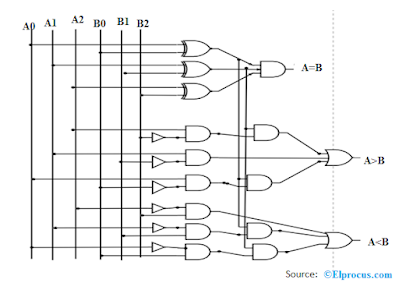3 bit Comparator Circuit Diagram:
Source of circuit diagram: https://www.elprocus.com/digital-comparator-and-magnitude-comparator/
VHDL code for 3 bit comparator:
library ieee; use ieee.std_logic_1164.all; entity comparator is port(a,b : in std_logic_vector(2 downto 0); --3 bit numbers to be compared a_eq_b : out std_logic; --a equals b a_lt_b : out std_logic; --a less than b a_gt_b : out std_logic --a greater than b ); end comparator; architecture gate_level of comparator is --declare internal signals used in the design signal temp1,temp2,temp3,temp4,temp5,temp6,temp7,temp8,temp9 : std_logic := '0'; begin temp1 <= not(a(2) xor b(2)); --XNOR gate with 2 inputs. temp2 <= not(a(1) xor b(1)); --XNOR gate with 2 inputs. temp3 <= not(a(0) xor b(0)); --XNOR gate with 2 inputs. temp4 <= (not a(2)) and b(2); temp5 <= (not a(1)) and b(1); temp6 <= (not a(0)) and b(0); temp7 <= a(2) and (not b(2)); temp8 <= a(1) and (not b(1)); temp9 <= a(0) and (not b(0)); a_eq_b <= temp1 and temp2 and temp3; -- for a equals b. a_lt_b <= temp4 or (temp1 and temp5) or (temp1 and temp2 and temp6); --for a less than b a_gt_b <= temp7 or (temp1 and temp8) or (temp1 and temp2 and temp9); --for a greater than b end gate_level;
Testbench for 3 bit Comparator:
library ieee; use ieee.std_logic_1164.all; --Note that I am using this library only in testbench. Generally its --advised to not use this library. use ieee.std_logic_arith.all; --testbench has empty entity entity tb_comparator is end entity tb_comparator; architecture behavioral of tb_comparator is signal a_eq_b,a_lt_b,a_gt_b : std_logic := '0'; signal a,b :std_logic_vector(2 downto 0) := "000"; begin --entity instantiation with named association port mapping comparator_uut: entity work.comparator port map(a => a, b => b, a_eq_b => a_eq_b, a_lt_b => a_lt_b, a_gt_b => a_gt_b); --self checking testbench. --checks for all combinations of inputs. stimulus: process begin for i in 0 to 7 loop for j in 0 to 7 loop --typecast integers to std_logic_vector. a <= conv_std_logic_vector(i,3); b <= conv_std_logic_vector(j,3); wait for 1 ns; --the below statements does the automatic verification if(a = b) then assert a_eq_b = '1'; elsif(a < b) then assert a_lt_b = '1'; elsif(a > b) then assert a_gt_b = '1'; end if; end loop; end loop; wait; --testing done. wait endlessly end process; end behavioral;
Simulation waveform from Modelsim:
Post-Synthesis Schematic from Xilinx Vivado:
You can see that 3 LUT6's were used to implement this logic. As a little homework, why don't you write the behavioral level code for a 3 bit comparator and see if the amount of LUT's used are more or less compared to what we have now. If you do this experiment, let me know the results in the comment section.



This is very academic. I am not a fan of design at this level. For FPGA's its actually detrimental. In any useful design, the user would just use:
ReplyDeletex <= '1' when (unsigned(a) < unsigned(b)) else '0';
This scales well, even beyond the 31b limit of integers.
@Chris : yes you are right Chris. I wrote this code from a academic point of view. In real project no body will write separate module for just a comparison. This post was for VHDL beginners for learning gate level modeling.
ReplyDeleteHELLO friend ,
ReplyDeletei have also coded for 3 bit magnitude comparator but its showing error . i am posting the code and i will next post the error. please check and make corrections .thanks in advance.
architecture Behavioral of bit_3 is
signal x0,x1,x2:STD_LOGIC:='0';
begin
x0<=not(a(0) xor b(0)) ;
x1<=not(a(1) xor b(1));
x2<=not(a(2) xor b(2));
a_gr_b<=(a and (not b)) or (x2 and a and (not b)) or (x2 and x1 and a and (not b));--a>b
a_le_b<=(b and (not a)) or (x2 and b and (not a)) or (x2 and x1 and b and (not a));--a<b
a_eq_b<=x2 and x1 and x0;
end Behavioral;
Line 45. and can not have such operands in this context.
ReplyDeleteand this error in three lines . in a_gr_b and a_le_b and a_eq_b
its showing error in line of a_gr_b and a_le_b that" and can not have such operands in this context".
ReplyDeletewhy we are using the below line?
ReplyDeletesignal temp1,temp2,temp3,temp4,temp5,temp6,temp7,temp8,temp9 : std_logic := '0';